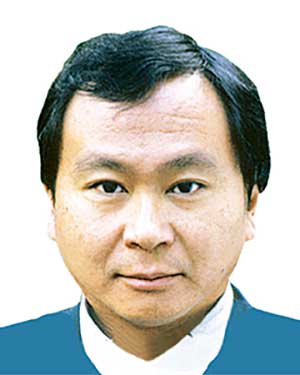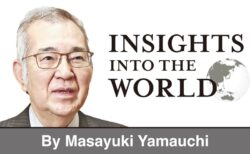22:13 JST, October 28, 2022
It is very easy to have apocalyptic fears about the state of global politics right now. A major war continues to rage in Europe, and the danger of nuclear escalation has never been higher since the 1962 Cuban Missile Crisis.
Nonetheless, there are reasons to hope that things will be better by the end of this winter, and that the world’s big authoritarian powers will be diminished in the end. The world’s democracies, by contrast, will have shown surprising unity and resilience.
Much of this hope for a positive outcome depends on battlefield developments in the current war in Ukraine. Russia invaded on Feb. 24 in hopes of quickly defeating its neighbor, changing the regime in Kyiv, and eventually incorporating the entire country into itself. The Ukrainians surprised everyone by turning back the Russian Army, which retreated from the capital of Kyiv and focused on expanding its gains in Ukraine’s east — the Donbas — and in the southern provinces. Moscow succeeded in making small gains over the summer, while turning Europe’s dependence on Russian gas and oil into a political weapon. It looked at the time that the conflict was stalemated in a way that would leave Moscow in control of almost a quarter of Ukraine’s territory.
This situation changed dramatically after the United States began supplying Ukraine with long-range artillery like the High Mobility Artillery Rocket System (HIMARS). Ukraine used these precision weapons to systematically target Russian ammunition dumps, control centers and air defenses. Then in early September their forces broke through and liberated much of the eastern province of Kharkiv, an advance that continued in October further south to the city of Lyman that was a critical railroad hub for supplying the entire Donbas. There has been a breakthrough in the south as well, with the Ukrainian Army advancing on Nova Kakhovka east of the port city of Kherson, where some 25,000 Russian troops are deployed.
In reaction to the Kharkiv setback, Putin announced his “partial” mobilization on Sept. 21. The latter has been a fiasco from the start, with military commissars sweeping up everyone regardless of age, ability, or former military service. These new draftees are apparently being sent to the front with no training and little equipment, and some have already been turning up dead or as prisoners. This has led some 700,000 young Russians to flee, or attempt to flee, the country. That is many more people than the Russian state has been able to mobilize for war. The social deal ordinary citizens had with Putin was to stay out of politics in return for peace and stability. This pact has been broken, and everyone is now feeling the effects of Putin’s war.
Putin once again responded by escalating. On Sept. 30, he announced the annexation of Donetsk, Luhansk, Kherson and Zaporizhzhia oblasts in a Moscow ceremony that reeked of fascism. On Oct. 8 the Ukrainians succeeded in seriously damaging the bridge over the Kerch Strait that is the main Russian supply line into the Crimean Peninsula. The latter was, of course, illegally annexed by Russia back in 2014 and is home to its Black Sea Fleet. The town of Nova Kakhovka on which the Ukrainians are advancing is the site of a canal providing the Crimean Peninsula with water. With both the canal and the bridge cut, the Russians will have great difficulty supplying their military in Crimea, putting the liberation not just of Kherson but of the entire region into the realm of possibility.
There has been a lot of talk and nervousness about the possibility that a desperate Putin will resort to nuclear weapons to save himself. This possibility must be taken very seriously, but there are many reasons to think that he will not cross this threshold. In the first place, the military gains from escalation will be small, since nuclear weapons — even small “tactical” ones — are better at terrorizing civilians than destroying enemy forces. The political blowback from any nuclear use will be enormous. The narrowing support that Putin has received from the global south will disappear. More importantly, the U.S. and NATO have a huge number of options for responding, the majority of which do not require symmetrical nuclear use. NATO has rightly resisted Ukrainian calls for a no-fly zone over Ukraine up to now, but this (with the attendant direct combat between NATO and Russia) will be immediately on the table in response to a Russian use of nuclear weapons. Putin is not irrational; he is a large risk-taker, but this risk is one that can easily lead to his personal demise.
Rather than resorting to nuclear weapons, the Russians have lashed out with missile strikes on Ukrainian cities. But these, like the “partial mobilization,” are signs of weakness rather than strength. The Russians are running out of missiles and sanctions have hurt their ability to rebuild their stocks. These attacks have not demoralized the Ukrainians; rather, they have strengthened their resolve to defeat Russia on the battlefield.
Recent Ukrainian military advances are critical for maintaining external support for the war effort, both in Europe and in the United States. When the conflict looked stalemated over the summer, there were calls for negotiations and Ukrainian concessions. But now the Ukrainians have shown that there is light at the end of the tunnel, and recent poll data indicates that support in Europe and the U.S. has actually increased since the summer. With Europe having stored sufficient gas over the summer, it seems very likely that governments there will be able to sustain sanctions and continue to supply weapons to Ukraine.
Putin himself may be in serious trouble domestically. There are plenty of reports of infighting among the elites in Moscow who run the intelligence services and the military, with everyone wanting to point a finger of blame for the debacle they face. Putin’s legitimacy rested on the belief that he was a strongman, but he now looks like a foundering fool. There is no way of telling who might replace Putin; they may be even more hard-line than him. But they will still lack real capabilities to reverse the defeat or avoid humiliation.
A Russian defeat in Ukraine will have big consequences for Asia. China is clearly unhappy with its “forever” ally Russia, as evidenced by Xi Jinping’s alleged criticism of Putin on the occasion of the Samarkand summit of the Shanghai Cooperation Organization. Military planners in Beijing must be wondering how their unproven forces will perform in a future conflict over Taiwan. Xi received the Communist Party’s blessing at the 20th Party Congress for a third five-year term, but this will come at a very difficult time for his country. China is undergoing a slow-motion regime crisis. There appears to be no way out of the zero-COVID policy trap that Xi Jinping finds himself in, and the entire growth model, based as it was on state-backed real estate investment, is crumbling. The latest real growth estimates by the World Bank put it at less than 3%, below the Asia-Pacific average.
There are still plenty of things to worry about. Populist parties made gains in Sweden and Italy, and the Republican Party in the United States continues its descent into anti-democratic madness. The Democrats will likely lose the House of Representatives next month, leading to two years of dispiriting deadlock and phony investigations.
But it is important to remember that democratic countries have ways of fighting back against dictatorship. The support that Ukraine has received around the world, including support from Japan, is very inspiring, and will be the basis for the strengthening of the “free world” into the future.

Francis Fukuyama
Fukuyama is a senior fellow at Stanford University’s Freeman Spogli Institute for International Studies.
Top Articles in Editorial & Columns
-

Riku-Ryu Pair Wins Gold Medal: Their Strong Bond Leads to Major Comeback Victory
-

40 Million Foreign Visitors to Japan: Urgent Measures Should Be Implemented to Tackle Overtourism
-

China Provoked Takaichi into Risky Move of Dissolving House of Representatives, But It’s a Gamble She Just Might Win
-

University of Tokyo Professor Arrested: Serious Lack of Ethical Sense, Failure of Institutional Governance
-

Policy Measures on Foreign Nationals: How Should Stricter Regulations and Coexistence Be Balanced?
JN ACCESS RANKING
-

Japan PM Takaichi’s Cabinet Resigns en Masse
-

Japan Institute to Use Domestic Commercial Optical Lattice Clock to Set Japan Standard Time
-

Israeli Ambassador to Japan Speaks about Japan’s Role in the Reconstruction of Gaza
-

Man Infected with Measles Reportedly Dined at Restaurant in Tokyo Station
-

Videos Plagiarized, Reposted with False Subtitles Claiming ‘Ryukyu Belongs to China’; Anti-China False Information Also Posted in Japan























